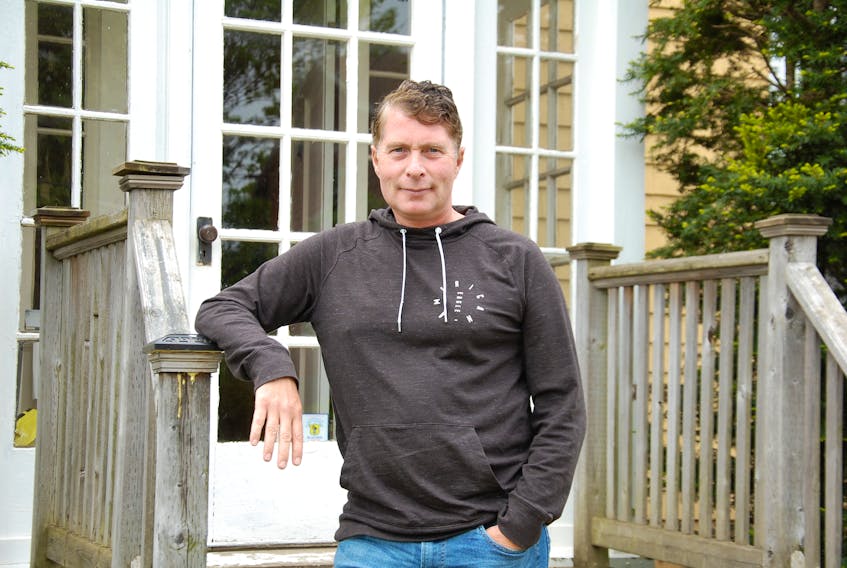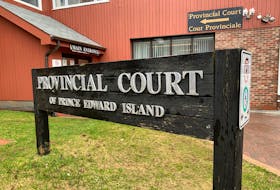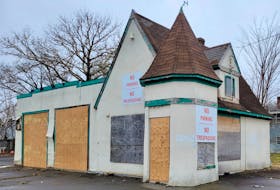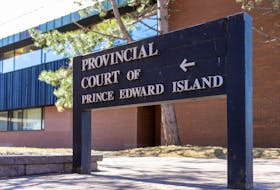Many have read Grant Matheson’s book detailing the crashing fall from grace of a well-respected Charlottetown doctor caught in a vicelike-grip of narcotics that proved extremely damaging and almost deadly.
More than 5,000 copies of “The Golden Boy: A Doctor’s Journey with Addiction’’ have sold since the book hit the shelves six months ago.
Matheson is aware a good number of people also borrowed a copy of the book rather than purchasing one. That means likely 10,000 to 15,000 people or more have read about his struggle with drug addiction that cost him his career as a family doctor.
“I never, ever dreamed it would have that kind of response,’’ he told The Guardian during an interview at his home earlier this week.

He believes the book has drawn so much interest because he addressed not only his addiction but highlighted a host of other struggles from marriage breakdown to grief.
“I tried to focus on all of the emotions I went through,’’ he says.
“So, people can identify with that.’’
He agrees, too, that people were captivated to read of a doctor falling from such an exalted position through addiction and abuse of position.
Matheson says he felt a sense of obligation to tell his story in hopes of helping others.
Writing the book, he notes, was not about trying to get in the limelight.
Having said that, Matheson has received tremendous attention as a result of his honest, warts-and-all account of his battle with addiction.
Matheson has given an estimated 30 media interviews, receiving national coverage along the way.
Roughly 20 speaking engagements have come on the strength of the response to the book. He has spoken to Island students at two high schools and two intermediate schools. He also spoke at a graduation of health administrators in Halifax and at a mental health event.
The College of Physicians and Surgeons of P.E.I. has expressed interest in Matheson, who was able to mask his drug addiction for a long period of time while continuing his family practice in Charlottetown, offering insight on what might help the college better protect patients.
The Medical Society of P.E.I. has also reached out to Matheson for input to assist in addressing physician health.
“I think what Grant’s case highlights is if you have one sick doctor it directly impacts the health care of thousands of Islanders,’’ says Dr. Kathie McNally, chairwoman of the standing committee on physician health with the Medical Society of P.E.I.
“We want to address any issue that keeps a physician from providing quality health care.’’
P.E.I. College of Physicians and Surgeons registrar Dr. Cyril Moyse told The Guardian a few months ago that likely roughly 10 per cent of Island physicians have the potential for addiction.
He noted at the time that the college’s mandate is not to get Matheson or any other doctor well but rather to ensure the public’s safety.
Related: Non-practising doctor details his harsh, humbling life as drug addict
Overall, Matheson describes the feedback to his book as “amazing’’ with doctors telling him they are “really glad’’ he came out with his story.
“A lot of people were shocked that it went on and it got so bad…that I was able to (work as a family physician while feeding his drug addiction) for that long,’’ he says.
He has only received a couple of negative comments since the book was released, including criticism for practising medicine while under the influence of drugs.
“You know, what can I say? I was wrong. I didn’t understand at the time that I was wrong and I obviously wasn’t functioning the way I should be. I can’t do anything about that now. All I can do is sort of tell my story, so it doesn’t happen to someone else.’’
The 53-year-old Matheson believes his story can serve as both a cautionary tale and as one of hope.

He says the overriding message of his book is that people should seek help as early as possible when they get sick.
Unfortunately, he notes, due to the stigma attached to drug and alcohol addiction, people often only get help, as in Matheson’s case, at a dangerously late stage.
Matheson is doing well today, though.
He eats healthy.
He does not touch drugs or alcohol.
And he regularly attends AA.
“It’s important for me to go now (to Alcoholics Anonymous meetings) because I’ve been doing so much speaking,’’ he explains.
“I feel like I need to listen a little bit to other people. It’s just my story I hear over and over and over. So, it’s important to hear other peoples’ stories.’’
Matheson no longer runs because of his damaged ankle, a chronic injury that he addresses with anti-inflammatory medication.
His trouble all began years ago when he started taking low doses of his patients’ leftover painkiller prescriptions to self-medicate for an ankle injury.
He got hooked.
He hopped from one pharmacy to the next to deceptively feed his habit. He would inject throughout the day in between seeing patients.
Eventually, the College of Physicians and Surgeons helped put an end to Matheson’s destructive path, suspending the doctor.
He ended up in rehab in Ontario in an intense one-month recovery that is powerfully detailed in his book.
“It’s almost impossible,’’ he says today with the benefit of hindsight, “to stop narcotic addiction without intervention or being placed in a facility to get better because your thinking gets so sick.’’
Matheson, who is drawing on disability insurance, says he misses treating people but does not miss the bureaucracy.
He is placing a priority today on staying healthy, remaining clear of drugs and alcohol and spending time with family, which includes managing his daughter’s provincial soccer team.
He can see a possible return to “something’’ in four to five years.
“Maybe not being a family doctor but doing something medical-wise,’’ he says.
“It could be helping in an addiction facility.’’
Treating doctors well
A physician health program was implemented on April 1 with the goal of trying to ensure physicians are healthy and resilient, allowing them to deliver the best possible level of health care, says Dr. Kathie McNally, chairwoman of the standing committee on physician health with the society.The Medical Society of P.E.I. is hoping to do a better job of helping sick doctors become well again.
“I think we need to do a better job, and that is why we worked so hard to have a comprehensive, efficient physician health program (implemented),’’ she says.

“We absolutely are providing something new through this program.’’
McNally says the Medical Society of P.E.I. has partnered with British Columbia Physician Health, which she notes has a very high-quality, extensive program.
Island physicians will have access to standardized care.
She says the first step with any sick physician, whether that be an addiction to drugs or a mental health issue or something else, is to ensure they receive an appropriate diagnosis. Following a comprehensive assessment, efforts will be made to ensure the safety of patients and proper treatment for the doctor.
“We want to address any issue that keeps a physician from providing quality health care,’’ says McNally, who works as a hospitalist at the Queen Elizabeth Hospital in Charlottetown.









